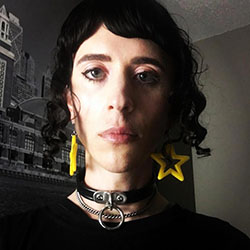What if male at birth is the first trauma? What if female at birth is the first grief?
Human bodies start female, geneticists say. Chromosomes (can) urge hormones to express sex characteristics. At some point (birth, puberty, death?), the formal qualities of the body (seemingly) solidify and (seemingly) speak to one’s content as women and/or men and/or nonbinary (and/or …?).
As a white woman of trans experience, I kaleidoscope away from fixedness through medical transition. As a writer, I bare the physical and cultural weight of my form & content. Western biologists have historically (devastatingly) correlated hormones with gendered behavior. How then do I (responsibly) portray in (non)fiction, for example, crying more my first year on estrogen than previous years combined? Or my trans masc lovers who uphold a non-toxic masculinity against T inspired surges of sexuality and aggression?
The field of dominant gender stereotypes blooms, full of thorns: What if estrogen from birth intensifies emotions? What if brashness from & within men is impersonal, biological?
…
Like many writers of marginalized identity, I can’t trust single narratives.
I am out thanks to feminist revisions of the gender binary—that popular fiction written to substantiate white supremacy. In my body/stories, I reclaim my gender expansiveness thanks to the Black, Brown, and Indigenous writers & activists who’ve exposed Western rationalizations as white cultural bias to justify oppression. I find heart enough to write toward transformation thanks to the words of Gloria Anzaldúa who reminds me, “Nothing happens in the ‘real’ world unless it first happens in the images in our heads.”
Yet, my uncertainty lingers. If plural interpretations of reality are plausible, what is true (about me)? What’s fiction? What’s non?
…
The discomfort of remembering (Latin memor = mindful & membrum = limb) seems common to us who come out and/or into ourselves later in life. Like, after decades of failing to translate myself into straight cis masculinity, how do I (re)interpret my 10-year-old desire to be Batman and not Batgirl? I might describe my terror of being caught playing with plastic kitchen sets, Barbies, and femme toys. I might blame my lack of exposure to queer women superheroes. The (re)interpretation: I couldn’t be Batgirl. Additionally, the record of my body requires reckoning, the parts molded during puberty with a finality that no gender affirming care can revise, an at times panic inducing labor, grieving alternate universes in which someone recognized and rescued me with puberty blockers.
When late queer friends share childhood memories, I hear our interpretive chorus, “I was so trans,” “I was so gay,” “I was so …” I sense the insistence of a through line, the truth of latent queerness, maybe led by a cultural bias toward a consistent (monolithic?) identity for historicity and/or to conform to expectations (either/or?) to claim Realness. I sense my interpretation of that interpretation is opened by my bias toward polyvocality. I sense we tell stories to shape our realities that shape stories that tell our realities to shape stories …
The truth is I’ve performed several genders and sexualities (gay, straight, queer, trans*, cis), scattershot but enough that any line might be threaded—the one still binding my bio family or curly wayward darlings. Maybe this is why I write braided flash—fragments and weaving characterize me best. To claim myself as many stories (proudly) (loudly) writes me as trans: “[…] when something that used to be called that is now called this. Something moves.” Refusal to read complexity as fractures or to prove legitimacy (under whose authority?) liberates me as a trans storyteller.
…
Truth matters. Body cameras, demographics, votes, the fossil record, hormone levels, emotions, myths, dreams—data is requisite of witness, insight, and justice. What I acknowledge as data also shapes (& is shaped by) my reality. Writing toward understanding then requires intellectual and ethical rigor as a meaning maker plus healthy skepticism of absolutes, the ability to hold multiple truths. At the heart of storytelling, this paradox beats. If I pledge allegiance to truth(s?), in the search I must trust.
…
In accepting the responsibility of (re)creation, I accept that remembering through (non)fiction revises the text of myself(s). I portray and attend to my life, and portray and attend to my interpretations of me, and portray and attend to those interpretations—and when uncertainty spirals, I recall the politics of who I write for and why. Readers puzzled by my form-content maybe aren’t critically engaged in lineage(s) of queer trans poetics or living transrealities. Except to trouble the archive, my work isn’t for them.
I write to kids like me, lost & alone without context to parse their experience(s). Like the trans writers who welcomed me to the party, I hope my stories rouse more singing, our voices creating “… the future by existing in the present.” Not to explain, “How am I here?” Simply to sing, “I am so here.”

Crystal K. (they/she) is a queer trans writer, chapbooks editor at Newfound, and author of the novel Goodnight. Their flash stories have appeared in Gertrude, Passages North, Peach Mag, [PANK], Hobart, ANMLY, and elsewhere. Crystal was a Tin House Scholar and has been nominated for Best of the Net. They write RPGs at Feverdream Games.

